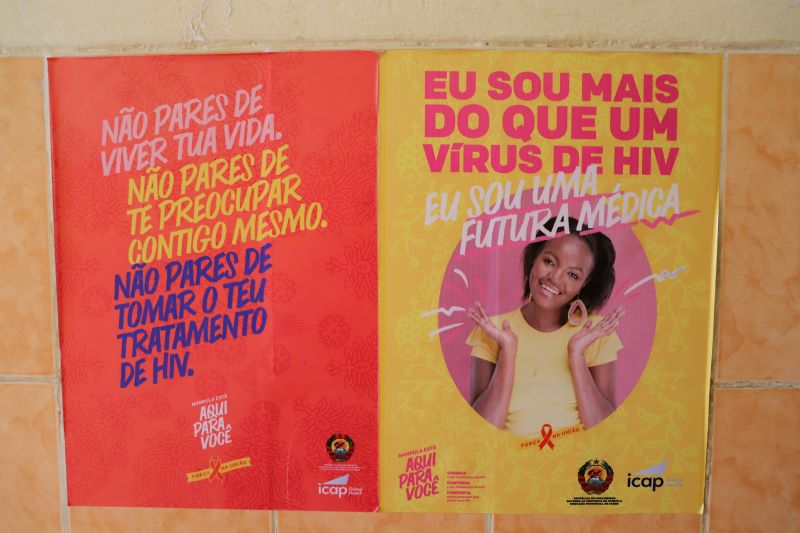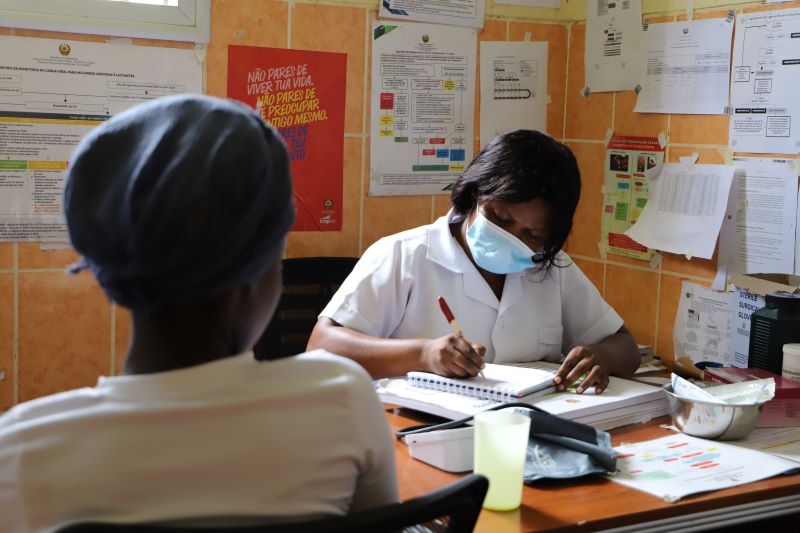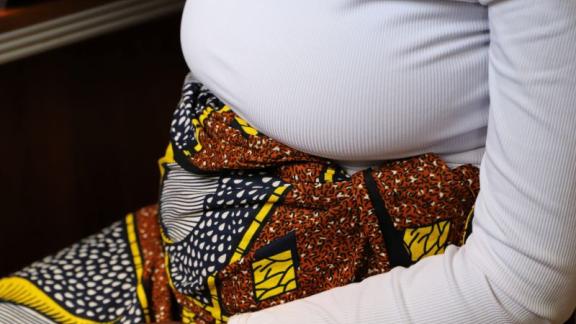In Mozambique, Associação Moçambicana para Desenvolvimento da Família (AMODEFA) is known for its expertise in the provision of quality sexual reproductive health and rights (SRHR) services to all people, including adolescents and young people.
Through the Stand Up project, AMODEFA is deploying its expertise to address the needs of adolescents and young people including pregnant teenagers. AMODEFA has trained over 40 healthcare workers in selected health facilities across three districts of Nampula Province to provide youth friendly SRHR services. In this article, we look at a story demonstrating how the project’s intervention contributes to improved access to care by a pregnant adolescent.
Nacala-Porto, Nampula province, Mozambique. Sandwiched between two young women, 18-year-old Carlita sits at the waiting bay of the Centro de Saúde Urbano (district health hospital) clinic, waiting for her turn to be attended to. Carlita is seven months pregnant and is at the clinic for her routine antenatal care (ANC) visit.
On Carlita’s left is 20-year-old Sofia, and on her right is 21-year-old Isabel. The three young women engage in animated conversation, characterized by the occasional soft laughter.
The waiting bay has other young women all awaiting their turn. Some are busy scrolling on their phones, while others are watching a video on a tablet. Some stare blankly into space, seemingly in deep thought. Two other young women are preoccupied with bright pamphlets containing pictures and messages about HIV & AIDS.
The walls at the waiting bay are colourful, plastered with posters of young people promoting messages about sexual reproductive health and rights (SRHR).

Warm reception
Shortly, Isabel’s turn arrives. She rises and walks into the consultation room. Several minutes later, she walks out, a smile on her face. She then signals to Carlita, telling her that it’s her turn.
A nurse with a hearty smile ushers Carlita into the room as she invites her to take a seat. The nurse, Emilia, begins by asking Carlita about her day. After recording a few details in the big book on her desk, she begins the physical examination on the pregnant adolescent.
She then instructs Carlita to step on the weighing scale, after which she records her weight.
Peer influence on healthcare-seeking behaviour
Carlita is a Grade 11 student, which is the first year of high school in Mozambique. This is Carlita’s first pregnancy. A few weeks after discovering she was pregnant; she visited Centro de Saúde Urbano to register for ante-natal care (ANC).
Carlita was encouraged to start her ANC visits by her friends who were already mothers. They told her that it was important that she does so, for a positive pregnancy outcome for both her and her baby.
The choice of the health facility to attend her ANC visits was easy for Carlita.
“All my friends attended their ANC visits here at Centro de Saúde Urbano. They said they liked it because the nurses were kind and had a good attitude, so I didn’t need much convincing. Besides, this hospital is the nearest one to my home, and I don’t have to pay for transport. I have been honouring every clinic appointment as scheduled by the nurses. I want to have a healthy baby, and that’s why I’m committed to coming to the clinic,” she says.
Complications of teenage pregnancy
As a pregnant teen, it is imperative that Carlita visits the clinic. In addition to various social, psychological, and economic risks associated with early pregnancy and childbirth, pregnant teens and their babies face additional medical risks that heighten their vulnerability to poor maternal and neonatal outcomes.
These include obstructed labour, eclampsia, postpartum haemorrhage, anaemia, preterm delivery, babies with low birth weight and maternal and infant morbidity or mortality. In Africa, girls aged 15-19 years are twice as likely to die during childbirth as women aged 20 years and above.
It is because of these reasons that nurse Emilia is always keen to emphasize the need for strict ANC adherence to all adolescent mothers who visit the clinic.
“We educate them about pregnancy, their nutritional needs, what to expect along the journey, and how to come up with a birth plan that includes delivery in a health facility with the assistance of skilled attendants. We also talk to them about the need for post-natal contraception to prevent another unplanned pregnancy. We counsel them, encourage them, and answer all their questions. We try and make their visits as comfortable as possible, as this goes a long way in ensuring they return for their next appointment,” she says.

Youth-friendly health providers
This kind of care extended by nurse Emilia and her colleagues towards pregnant teens is aimed at eliminating some of the barriers that young people face in their quest to access quality sexual reproductive health (SRH) services.
These barriers include judgemental attitudes by service providers and denial of services, stigmatization, and fear of being seen by their parents, older neighbours and school authorities while seeking SRH services.
The healthcare workers at Centro de Saúde Urbano who provide youth-friendly services to young women like Carlita are beneficiaries of a series of trainings conducted by IPPF’s Member Association in the country, Associação Moçambicana para Desenvolvimento da Família (AMODEFA).
Cognizant of the fact that healthcare providers play a key role in determining young people’s experiences in accessing SRH services, AMODEFA trains service providers on best practices that help to improve their service delivery to this unique demographic.
“Among others, the trainings sensitize them on the unique needs of adolescents and youth, and this helps in ensuring that every young person seeking SRH services at the health facility leaves with a positive experience” says Mr. Santos Simione, AMODEFA’s Executive Director.
Enhancing privacy for young people seeking SRH services
In addition to training service providers and offering continuous supportive supervision, AMODEFA, through the Stand Up project, offers technical guidance to select public health facilities in Nampula province on the establishment of youth-friendly corners.
Youth-friendly corners, which are integrated into existing health facilities, are safe spaces where adolescent and young women like Carlita, Sofia and Isabel can feel comfortable accessing SRH services. Youth-friendly corners help to improve young people’s uptake of SRH services.
Nurse Emilia talks about the youth-friendly corner at Centro de Saúde Urbano.
“Adolescents and youth need to feel at ease while accessing services, and with AMODEFA’s guidance, we set up a youth-friendly corner in a secluded space that is away from the glare of the public. The designated area accords them privacy, which helps them feel relaxed while waiting for their turn to be served. We also issue them with a tablet that is connected to the internet and which they use to watch videos as they wait” she says.
Additionally, the nurse says that the door of the consultation room can be shut, enhancing discretion for the client while being attended to.
“This is very important for young people. When in the consultation room, they don’t want someone eavesdropping on what they are saying or seeing the services they have come for. Their need for privacy is paramount” she says.

A pregnant teenager’s satisfaction accessing maternal health services
It is the simple things like this that attracts young people like Carlita to the facility.
“I feel comfortable here. I usually find many other young women like me in the waiting room, and that makes me feel contented. The nurses are nice, and they treat me well. I plan to deliver my baby in this hospital, and I will also return for my post-natal visits here. I’ll also come back for a family planning method after that since I don’t want to become pregnant again so soon” she says.
Mr. Simione, AMODEFA’s Executive Director says that the organization’s clinics have youth-friendly corners, which have helped serve thousands of young people. This is a model that has increased young people’s uptake of services.
“At AMODEFA’s youth-friendly corners, adolescents and youth receive educative health talks offered by their peers and mentors, counselling, and referrals to other health services within the facility such as family planning, HIV testing and STI management. We ensure they receive services in a timely manner, which are provided by qualified health workers who are well-trained on their unique needs”.
At AMODEFA facilities, Mr. Santos adds that both male and female condoms are available to young people, at no cost.
“Our youth-friendly corners are a hang-out space where they can watch educative video shows, play board games, and engage in other fun activities as they empower each other on positive health-seeking SRH behaviour. Through the Stand Up project, AMODEFA has been able to extend this support to facilities such as Centro de Saúde Urbano”.
Teenage pregnancy in Mozambique
In Mozambique, the rate of unintended pregnancies among women aged 15 to 49 is high, at 88 per 1,000 women (2015-2019). The adolescent birth rate is even higher, at 169 per 1,000 girls aged 15-19 (2017). Nampula province has a worrying trend of nearly half of all girls aged 15-19 being teenage mothers.
According to Ms. Sylvia Ekponimo, the Stand Up Project Advisor, “Stand Up through partnership with government-owned health facilities in Nampula province such as Centro de Saúde Urbano, is helping to improve adolescent and young women’s access to quality SRHR services to address a wide range of issues such as adolescent pregnancy. We strive to serve as many beneficiaries as possible with services that are tailored to their unique needs”.
The initiative is yielding positive results as corroborated by service statistics from health facilities supported by Stand Up. For example, the number of girls aged 15-19 years who accessed a modern method of contraception increased from 267 in the January-March 2023 period to 4,451 by October-December 2023.

The Stand Up project
Funded by Global Affairs Canada (GAC) through Oxfam Canada, Stand Up is a 6.5 year multi-stakeholder, multi-country initiative that contributes to the increased enjoyment of SRHR services by adolescent girls and young women (10-29 years), other women of reproductive age (30+ years), and men and boys, in strategically selected Mozambican and Ugandan districts.
IPPF Africa Region and its Member Associations in both countries are responsible for the component of the project that aims to strengthen knowledge and capacity of service providers and healthcare facilities to improve the provision of comprehensive SRH information and services.
The Stand Up project is currently in its fourth year of implementation and since inception, over 40 health workers have been trained by AMODEFA. These service providers have in turn served hundreds of adolescents and youth, ensuring they receive quality SRHR services that are tailored to their exceptional needs. In the third year of implementation, the project provided comprehensive SRH information and services to over 200,000 adolescents and young people with 90% being female.
Follow IPPF Africa Region on Facebook, Twitter, Instagram and You Tube.
when
country
Mozambique
Related Member Association
Associação Moçambicana para Desenvolvimento da Família










